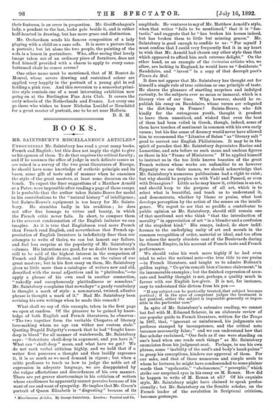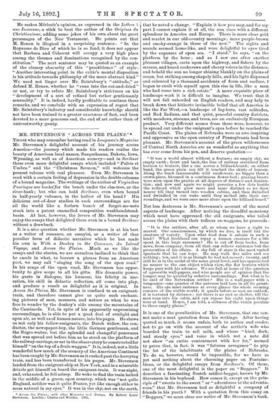. BOOKS.
MR. SAINTSBURY'S MISCELLANEOUS ARTICLES.* UNDOUBTEDLY Mr. Saintsbury has read a great many books, French and English ; but this does not imply the right to give us his opinion of them. To do that requires the critical faculty; and if he assumes the office of judge in such delicate issues as are raised in a survey of the two great literatures of Europe, he should have some knowledge of aesthetic principle and its bases, some gift of taste and of manner when he examines the style of the great masters, at least some decorum on the bench. To expect the finer suggestions of a Matthew Arnold or a Pater, were impossible after reading a page of these essays. It is probable that the author takes Sainte-Beuve for model in his contributions to the "natural history" of intelligence ; but Sainte-Beuve's equipment is too heavy for Mr. Saints- bury. He stumbles badly in his erudition ; he does not offer fine homage to virtue and beauty, in which the French critic never fails. In short, to compare them is the severest condemnation of the English imitator we can imagine. As it is true that Englishmen read more French than French read English, and nevertheless that French ap- preciation of English literature is indefinitely finer than our attempts to write of theirs, we can but lament our failure, and feel less surprise at the popularity of Mr. Saintsbury's volumes. His intentions are good, for no doubt there is much still to be said of the highest interest in the comparison of French and English diction, and even on the values of our great masters ; but in his first essay on them, Mr. Saintsbury gives us little more than a catalogue of writers new and old, described with the usual adjectives and in "platitudes,"—to apply a phrase of his own used in another connection, "nakedly and cacophonously platitudinous or senseless." Mr. Saintsbury complains that nowadays " a gaudy vocabulary is thought a mark of style : a non-natural, twisted, allusive phrase is thought a mark of it." Had Mr. Saintsbury been revising his own writings when he made this remark What shall we say of this example, taken in the first page we open at random. Of the pleasure to be gained by know- ledge of both English and French literatures, he observes : " The two together form the veritable Cleopatra of literary love-making whom no age can wither nor custom stale." Quoting Dagald Dalgetty's remark that he had "fought knee- deep in blood " for all manner of watchwords, Mr. Saintsbury says : " Substitute skull-deep in argument, and you have it." What can " skull- deep " mean, and what have we got ? We do not rank verbal criticism highly, and we hold that if a writer first possesses a thought and then lucidly expresses it, it is as much as we need demand in rigour ; but when a critic professes to teach us how to judge the noble art of expression in adequate language, we are disappointed by the vulgar affectations and discordances of his own manner. There are yet graver shortcomings in his criticism of writers whose excellences he apparently cannot perceive because of his want of ear and want of sympathy. He implies that Mr. Green's portrait of Queen Elizabeth is " disgusting " because of its
• Miscellaneous Articles. By George Saintsbury. London: Percival and Co.
amplitude. He ventures to say of Mr. Matthew Arnold's style, when that writer "falls to be mentioned," that it is " fan- tastic," and suggests that he "has broken his horses indeed, but has broken them to little but mincing graces." Mr.
Saintsbury is good enough to confide to Oa : " For myself I must confess that I could very frequently find it in my heart
to wish that Mr. Arnold had chosen any other style than that
which appeared to afford him such extreme delight." On the other hand, as an example of the ecrivaius artistes who, we
allow, are lacking in England, he would have us " desiderate " Baudelaire, and " invest" in a copy of that decrepit poet's Pleura du Mal.
It does not appear that Mr. Saintsbury has thought out for himself a single rule of true criticism or one principle of taste.
He shares the pleasure of startling surprises and indulged curiosity, be the subjects ever so mean or immoral, which is a literary vice of our time. Why, however, should he re- publish his essay on Baudelaire, whose verses are relegated to the dirt-heap in France ? Sainte-Beuve, who - felt kindly for the outrageous youth, thought it prudent to leave them unnoticed, and wished that even the best
of them had been veiled in Greek, though, indeed, some of them have touches of sentiment in common with his own early verses ; but his fine sense of decency would never have allowed
him to recommend the " Litanies of Satan " as "literary salt " good to correct our English Philistinism. It may be in the spirit of paradox that Mr. Saintsbury depreciates Racine and Lamartine, and sets before us such mean and unclean figures as those in his " Frame of Miniatures." If he applied himself to instruct us in the too little known beauties of the great French writers whose works are unfamiliar to us however flippantly we use their names, we should acknowledge that Mr. Saintsbury's numerous publications had a right to exist; but why should he perplex us with Valle and Panard, or even with Desaugiers ? Little as he may know it, criticism is an art, and should keep to the purpose of all art, which is to select what is beautiful, and teach us to understand it, and demonstrate, whether by blame or praise, what best develops perception by the action of the senses on the intelli- gence. We regret to see that so prolific a contributor to public opinion as Mr. Saintsbury, should still remain one of that moribund sect who think " that the introduction of morality" in appreciation of art " is a blunder and a confusion of the stupidest kind." His essays, indeed, do show indif- ference to the underlying unity of art and morals in the common recognition of order, material or ideal, and too often he echoes the nearly obsolete cant of the Boulevards during the Second Empire, in his account of French taste and French performance.
We should value his work more highly if he had even tried to seize the national note—the true title to our praise —in French literature, and taught us to admire Boileau's golden saying, " Ce qu'on concoit bien s'enonce clairement," in its innumerable examples ; but the finished expression of accu- rate and healthy thought is not, perhaps, a quality much in favour with our English law-giver. It is not, for instance, easy to understand this dictum from his pen :— " If any subject can be poetically treated, that subject becomes poetical ; if in the eyes of competent judges the treatment is not poetical, either the subject is impossible generally or impos- sible in the particular case."
In spite of Mr. Saintsbury's extensive reading, we cannot but feel with M. Edmond Scherer, in an elaborate review of
our popular guide to French literature, written for the Temps in 1887, that, " ignorant or uninformed, his judgments are
perforce stamped by incompetence, and the critical note becomes necessarily false;" and we can understand how that fine scholar exclaimed, " One feels as if one were standing on one's head when one reads such things" as Mr. Saintsbury enunciates from his judgment-seat. Perhaps, to use his own
phrase, some " inability of the soul's and body's hand-palms" to grasp his conceptions, hinders our approval of them. For our sake, and that of those numerous and simple souls to whom he lectures, he might have condescended to some plainer words than " apolaustic," " obolescence," " proreptic," which
strike our surprised eyes in his essay on M. Renan. How did he happen to write of M. Renan at all ? Of his exquisite style, Mr. Saintsbury might have claimed to speak profes- sionally; but Mr. Saintsbury on the Semitic scholar, on the French leader of the revolution in Scriptural criticism, becomes grotesque. He makes Merimee's opinion, as expressed in the Lettres a, une Inconnue, a stick to beat the author of the Origines du Christianisme, adding some jokes of his own about the great personages of the New Testament. He points out that M. Renan is illogical in a surprising sentence : " In the Royaume de Dien of which he is so fond, it does not appear that Barbara and Celarent will occupy a very high place among the thrones and dominations recognised by the con- stitution." The next sentence may be quoted as an example of the clumsy obscurity of this " practitioner " of style : " Another interesting point in the critic's mental disposition is his attitude towards philosophy of the more abstract kind." We need not linger over Mr. Saintsbury's " attitude," or defend M. Renan, whether he "runs into the cut-and-dried" or not, or try to refute Mr. Saintsbury's strictures on his " development of a sort of refined but rather gentlemanly sensuality." It is, indeed, hardly profitable to continue these remarks, and we conclude with an expression of regret that Mr. Saintsbury's industry and considerable knowledge should not have been trained to a greater exactness of fact, and been devoted to a more generous end, the end of art rather than of untrustworthy gossip.



































 Previous page
Previous page